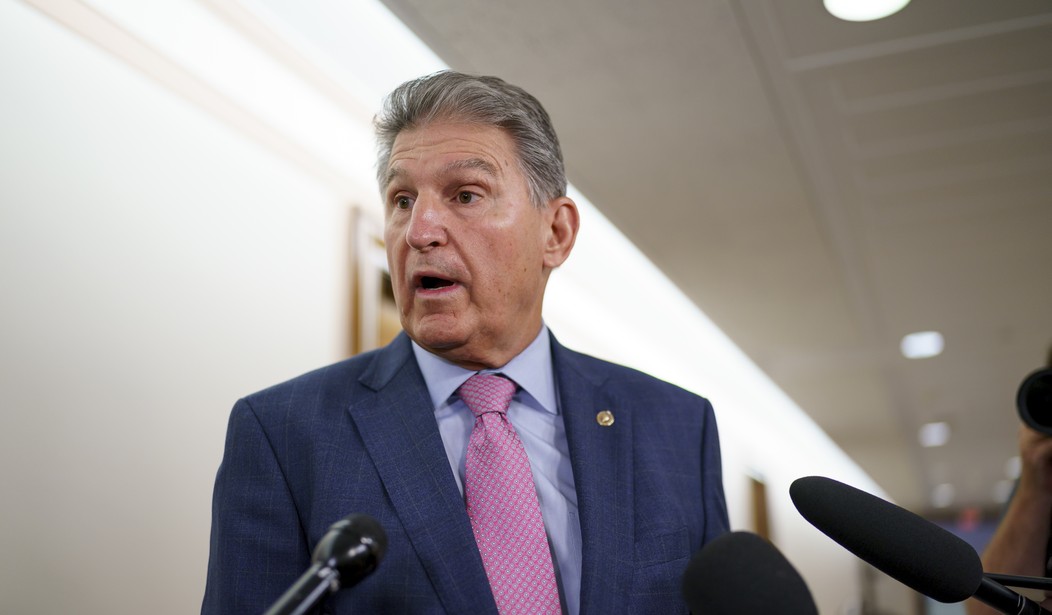Shadow President Joe Manchin continues to wreak havoc with the Democrats’ agenda in the Senate. As Ed already reported, Manchin was all set to support an amendment in the continuing resolution this week that would have defunded Biden’s large employer vaccine mandate. In the end, though, that effort didn’t pan out and Manchin wound up voting against the amendment, so the CR passed. But now King Joseph is looking for a second bite at the apple. Rather than simply defunding the mandate for employers with more than 100 workers, he has co-sponsored a bill that would cancel the mandate entirely. All of the Republicans in the Senate are supporting a measure based on the Congressional Review Act that would put an end to the executive order, so with Manchin’s support, it will probably come up for a vote next week. But that doesn’t mean that it’s going to happen, of course. (The Hill)
Sen. Joe Manchin (D-W.Va.) said on Thursday night that he is supporting a GOP effort to nix President Biden’s vaccine mandate for larger businesses, which is expected to get a vote in the Senate next week.
“Let me be clear, I do not support any government vaccine mandate on private businesses. That’s why I have cosponsored and will strongly support a bill to overturn the federal government vaccine mandate for private businesses,” Manchin said in a statement.
“I have long said we should incentivize, not penalize, private employers whose responsibility it is to protect their employees from COVID-19,” he added.
Under the rules of the CRA, only 51 votes are required to pass the measure, so it’s conceivable that it might go through. But then it would need to be approved in the House, and it’s unlikely that Nancy Pelosi will even bring it up for a vote. Even if we were to imagine that it would somehow survive a vote there, Biden would have the option of vetoing it anyway and there aren’t enough votes to override him. In other words, this is all for show and it’s not going to wind up happening.
What’s even more curious to me than the fact that this measure is being considered is Manchin’s rationale for supporting it in the first place. While I’m all in favor of shooting down vaccine mandates, shouldn’t there be some consistency in the opposition to them? I’ll grant that Manchin has been consistent in saying that he supports vaccine mandates for federal employees and the military, but not for the private sector. He’s also vaccinated himself (with a booster) and “encourages” all of the people of his state to get the shots.
But why is it okay for the President to make vaccines mandatory for government employees and military members but not workers in the private sector? Even if you are 100% sure that vaccines stop the spread of COVID (an idea with less credibility every day), are government employees somehow more at risk than private-sector workers? Do workers in the private sector have more inherent rights than their federally employed counterparts based on nothing more than who signs their paychecks? It just doesn’t make any sense.
I don’t know why I’m acting all surprised about this. Much of the federal response to the pandemic this year hasn’t made a lot of sense, and the more data on the virus that we accumulate, the more questionable many of the White House’s actions appear. And now, if the new Omicron variant and whichever other mutations come on its heels turn out to be able to basically shrug off the vaccines, mandates make even less sense. But as Peter Nicholas pointed out at The Atlantic this week, it’s probably too late for this debate. Joe Biden “bet it all” on vaccine mandates getting the country out of this pandemic in a timely fashion and he didn’t have a plan B if it didn’t work. So like a gambler on a losing streak, he’s probably just going to keep playing until he runs out of chips.








Join the conversation as a VIP Member